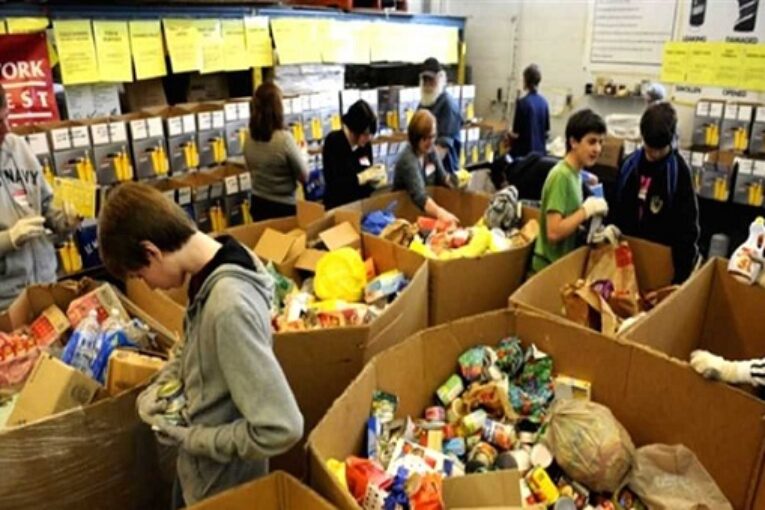
‘We’re seeing five to 10 in groups coming every day,’ says board president, adding other food banks and churches are running out of supplies
The board president of a food bank in Brampton, Ont., says her facility has become so overrun with international students seeking free food that she has had to put up a sign telling them to stay away.
The whiteboard outside the Ste. Louise Outreach Food Bank on Haggart Avenue includes information on opening times and where new clients and those with appointments should line up. But at the bottom, it adds: “Do not enter food bank / No international students!! (Government regulations)”
Reached by phone, board president Catherine Rivera told the National Post that food banks have always had the occasional student show up at the door, sometimes to defraud the system, sometimes misunderstanding how it works, sometimes in real need. But never this many.
“What’s happened this September,” she says, “is we’re in the middle of serving families, and then you get a group of kids – you know, you can tell they’re very young students with backpacks. And they’re coming with little smiles on their faces when they say, ‘We want to get food.’
“And we say: Are you a permanent resident of Brampton? And they’ll say: No, we’re students.”
She adds that what started as one to two students a day in September soon escalated to three or four. “And now we’re literally seeing five to 10 in groups coming every day. And it’s happening with a lot of the other food banks. And I’m getting calls now not only from food banks, but churches in Brampton, saying that they’re running out of supplies, because they have this influx of students coming.”
The “Government regulations” notice on that white board refers to government of Canada rules, which require international students to provide a statement of financial support before they are issued a study permit. “You must prove that you can support yourself and the family members who come with you while you are in Canada,” a government web site says, stipulating $10,000 per year (not including tuition) for the student, plus $4,000 for an accompanying family member.
Rivera thinks part of the problem could be unscrupulous agents in other countries who are telling would-be students that Canada will offer them free food when they arrive. She’s also heard of blog posts and YouTube videos with titles like “How to get free food in Canada.”
But she’s personally seen students who are fully aware they’re misusing the system. “We show them the documents that we got off the government website. And they laugh and walk away, because they already knew. Or the other thing is they say, ‘Well … we just got food from the other place.’
“And our thought is: ‘Excuse me? You just went to a food bank, and now you’re coming here?’ So there’s abuse happening now where they’re not only going to one, but they’re going to many, and they know darn well that’s not what’s supposed to happen.”
The sign outside Ste. Louise (named for the patron saint of social workers) went up several days ago, and was posted on the website X by Darshan Maharaja, a chartered accountant from India who now lives in Canada and runs a website that “offers analysis of Canadian current affairs and topics from a multicultural point of view.”
He followed up his post with a six-minute “elevator chat” on YouTube in which he carefully, cautiously unpacks the issue. But his conclusion is brusque.
“The whole study permit policy has degenerated into a multi-faceted fraud, where the dishonest make a killing, the honest suffer, and Canadians end up being divided and fighting among themselves,” he concludes. “My view is that the entire policy of study permits needs to be scrapped and rebuilt from scratch, incorporating safeguards against all the problems and malpractice that we have witnessed so far.”
In the meantime, Rivera is weighing her options while girding against an influx of even more students, needy and not.
“We’re at a point where we need some intervention here on the food banks not being inundated and overwhelmed with people coming to the doors and interfering with the service for those that need help,” she says. “We’re entering our busiest season, Christmas, when our numbers practically double, just because the pressures on some families become greater this time of year.”
She adds: “With the war in Ukraine, and with a lot of insecurities around the world, we’re getting people from all over the world coming now. And those that are coming legally with their refugee status, they get assistance right away. But you know, when we get people that walk up and say, ‘I have a visitor’s pass and I want food,’ well I’m sorry but we can’t do that. We can’t handle every student and every visitor that comes into the country.”
She’s considering reaching out to Brampton’s mayor, Patrick Brown. She’d also like to contact some of the schools that operate in Brampton, which include campuses of Algoma University and Sheridan College, as well as a number of private post-secondary institutions.
“To say, are you aware of this? Is there any way that you can let your students know that this is not what food banks are for? To help local residents, not to help every John Doe that jumps off an airplane.”
The sign has garnered attention, and Rivera welcomes it. “We don’t have that kind of funding, we don’t have that kind of manpower, and we certainly don’t have the space or resources to handle just anybody coming to the door like that. So we don’t know what the answer is, but maybe some kind of news reporting may help to bring awareness to the situation.”
She adds: “We’re open to any kind of suggestions or ideas or how people feel about it. We would really like to have the feedback.”
-Nationalpost




